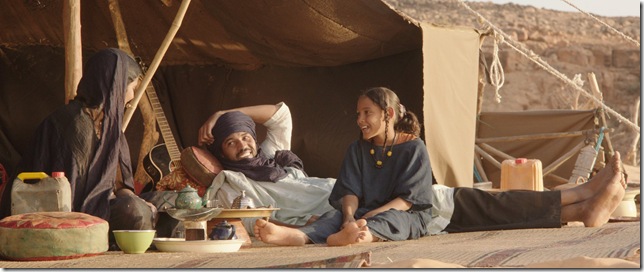As South Florida continues to screen the holdovers from the 2014 Oscar season, it’s clear that the most courageous movie of this past year isn’t Clint Eastwood’s intense but airbrushed glorification of an American sniper, nor Morten Tyldum’s careful, formula-hampered biopic of Alan Turing, nor even Ava DuVernay’s vital event movie, Selma.
Nope: The past year’s distinction in bravery belongs to Timbuktu, a devastating indictment of Islamic fundamentalism from Mauritania’s Abderrahmane Sissako, which finally opens in local theaters Friday.
The significance of Timbuktu cannot be overstated: As we’re still mourning immolated Jordanians and slaughtered French satirists, Sissako’s film is not just timely — it’s dangerous. Lesser statements about Islamic extremism have led to the assassination of artists like Sissako, who should probably be sleeping with one eye open these days.
As the movie begins, a deer scampers across a desert as the sound of bullets pierce the air. Sissako shows us their source: shadowy jihadists from the Islamist group Ansar Dine, positioned in a hulking, invasive truck, screaming across a dirt road with weapons in the air and a black flag whipping in the wind. The deer makes it out alive, perhaps: They’ve arrived at their destination, a session of target practice on African totems. Sissako trains his camera on the objects, not the subhumans defiling them: holes blown through sacred wooden sculptures, shattering eyes and breasts and arms into woodchips. The symbolism couldn’t be clearer.
The jihadists arrive in the Mali city of Timbuktu — which the real Ansar Dine briefly occupied in 2012 — where they preach their perversion of Islam to the melting pot of largely Muslim cultures cohabitating in a remote village. Wearing flak jackets inscribed with the words “Police Islamique,” they patrol the streets for indications of secular pleasures — music, sports, women’s uncovered hands and ankles — and screech sharia law through tacky bullhorns. Even with their guns, these true believers are ridiculous crusaders: raving tin-pot tyrants who are not taken seriously by most of the locals. This is where the film draws its occasional knowing humor, until the lashings and stonings begin apace.
A reclusive herdsman, Kidane (Ibrahim Ahmed), who lives a peaceful existence with his wife and young daughter, is soon caught in the fundamentalists’ crosshairs: Not for playing music, but for running afoul of the law after the death of a neighboring fishmonger — the result of a regional dispute that spiraled out of control. Sissako generates bravura suspense from this brief but jolting conflict, set in a shallow lakebed where one man emerges alive from a semi-submerged struggle. Shot in an unsparing wide lens, as one man walks away while the other flounders for his last gasps of air, it’s perhaps the greatest single shot in any movie from the past year —the sort of image Kurosawa or Leone would have envisioned, one which validates the necessity of CinemaScope photography.
Kidane will soon confront the harsh reality of sharia justice, but Sissako casts his thematic net far wider, exploring the impact of the occupation on the entire village, from forced marriages and the invasions of homes, mosques and soccer fields to the occupiers’ pathetic attempts to sway public opinion in their favor. That masterful, cringe-worthy scene in Foxcatcher, when Mark Ruffalo’s Dave Schultz is prompted to glorify his psychotic coach for a propaganda film, sees a sad correlative in Timbuktu, where a young man, morally “defiled” by modern rap music, is forced to reveal his Road to Damascus conversion on camera, crediting the purification efforts of Ansar Dine. But he’s not a good enough actor to pull it off this hogwash convincingly.
It’s one of many examples of the movie’s inherent, stone-faced absurdism, viewing the Ansar Dine occupation for what it was: an attempt to turn back time in the guise of religious piety. The donkey may seemingly be Timbuktu’s main form of transport, but the residents also have satellite dishes and iPhones, creating an environment of 21st century modernity disrupted by an invasion of 11th-century barbarism, of progression stifled by regression and oppression.
And Sissako is nothing if not a true progressive — outspoken and fearless, and driven by a deep and unvarnished humanism for the dispossessed, which includes moderate believers. Only militant fundamentalists will view Timbuktu as anti-Muslim; the rest of us will applaud Sissako’s forthrightness at exposing the religion’s destroyers.
Much of the film’s worldview is contained within a single scene, early on, in which the jihadists are rebuffed when they try to enter a mosque while carrying weapons, an affront to the worshipers. “Where is the leniency, where is the piety?” one believer asks an invader. “Where is God in all this?” Indeed.
TIMBUKTU. Director: Abderrahmane Sissako; Cast: Ibrahim Ahmed, Abel Jefri, Toulou Kiki, Layla Walet Mohamed, Mehdi A.G. Mohamed, Fatoumata Diawara; Distributor: Cohen Media Group; Rating: PG-13; Opens: Friday at Regal Shadowood and Living Room Theaters in Boca Raton, Cinema Paradiso in Fort Lauderdale and the Tower Theater in Miami
